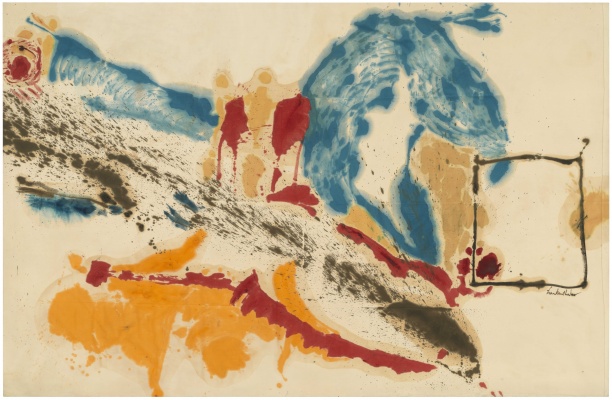Descripción de la Exposición
Alejandra von Hartz Gallery presents “Invisibles Palpables”, a solo exhibit of works by outstanding artist Luis González Palma.
Born in Guatemala in 1957, the output of the artists is strongly determined by the necessity to materialize sensitivity and emotion; to “conceptualize the utopic space of that which is not representable.”* In this sense, the most significant accomplishment of González Palma’s new work resides in radicalizing his visual concept, subjecting photographic images to a purging process that restores them to their maximum essence: abstraction.
In his 2013 Möbius series, Luis González Palma had already delved into the language of abstraction, albeit without renouncing a figurative component. He intervened said series by the superposition of geometric color planes on his old and new photographs of Mayan-Guatemalan individuals. The pursuit of this path resulted from his obsession with achieving an emotional representation of the world as well as the possibility of exploring contemporary forms of expression. One also perceives certain constantly present ideal and esthetic components that are also found in the artist’s first exhibit in this gallery: the importance of historic archives, the value of hand-picked support, subjective elaboration, and a degree of nostalgia - an attachment to the memory of history and the temporality of events.
The show, which was prepared in two stages, is an incursion into what the author calls Lyrical Abstraction: “a way to gain access into a deeper and more complex consciousness, in search of a reality that relates to emptiness and sacred space through images representing meditative visual spaces that are as uncertain as they are loaded with mysterious geography.” In order to produce these two marvelous series, Luis González Palma dug into the photographic archives of the Mesoamerican Regional Research Center (CIRMA) in Antigua, Guatemala, and the Astronomic Observatory of Córdoba, Argentina.
The first series, dubbed Hesequía (a technical term, borrowed from the history of monastic spirituality that refers to a being’s total state of stillness and silence) goes back to some of the works by Juan de Jesús Yas, one of the pioneers of Guatemalan photography in the 19th century. González Palma digitally eliminated the portraits of priests along with any religious imagery from the photos so that the only visible information left is produced by the irregularities of silver, the evidence of human touch, and the chemical reactions caused by changes in temperature and humidity. His intention is to show the visual content of a history that is perceptible in the materiality of the photographs and the vestiges that the passage of time has left in them. In the artist’s own words, the works question the idea of emptiness and time in a metaphysical sense. The production expresses Nothingness, as a spiritual search, and the registration of existence, in a way that closely resembles a portrayal of beauty more in tune with oriental preconceptions. Thus, in his outstanding essay titled “Praise the Shadow”, Junichiro Tanizaki posits that the effects of time - as irresistibly evoked by the shine that lightly alters an object because of dirty hands, oil, soot, or by the outdoors - is not only a component of beauty but curiously also soothes the heart and calms nerves.
In his second series, González Palma shows even more evidence of Oriental influence. He has named it Koan, a term from Zen philosophy that refers to a question without a logical solution, intended to disrupt the pattern of normal thought and penetrate into a sudden, illuminated consciousness. In his astronomical photographs, taken at the Observatorio de Córdoba (first of its kind in Latin America and therefore the first place in the region to produce cosmic images), he establishes a visual consideration that evolves into: 1. Astrophotography: collages made with photographs of comets, the moon, and solar eclipses; 2. Spectrums: an inquiry into new forms of representation through the registration of spectral lines (visible radiations whose intensity is too low to be perceived by the human eye); and 3. Cosmic Dust (space dust composed of small particles smaller than 100 µm): consisting of geometric drawings made from photograms of cosmic rays taken in Argentina between 1945 and 1948.
Both projects represent the artist’s search for an introspective space through abstraction. This is without question an extremely personal exhibit where one notices the risk taken by an artist who has already consolidated his position in the art world and yet bets, with singular mastery, on the absence of a figurative component. Nonetheless, González Palma is able to maintain that immanent sense of the possibility of capturing the essence of the universe that is present in all his works, from the first ones made in the late 80’s to those he introduces today.
*Cecilia Fajardo-Hill. The Contingency of the Gaze in Abstraction, Luis Gonzalez Palma, La Fabrica 20 años

Exposición. 11 abr de 2025 - 28 sep de 2025 / Museo Guggenheim Bilbao / Bilbao, Vizcaya, España

Formación. 08 may de 2025 - 17 may de 2025 / Museo Nacional Centro de Arte Reina Sofía (MNCARS) / Madrid, España